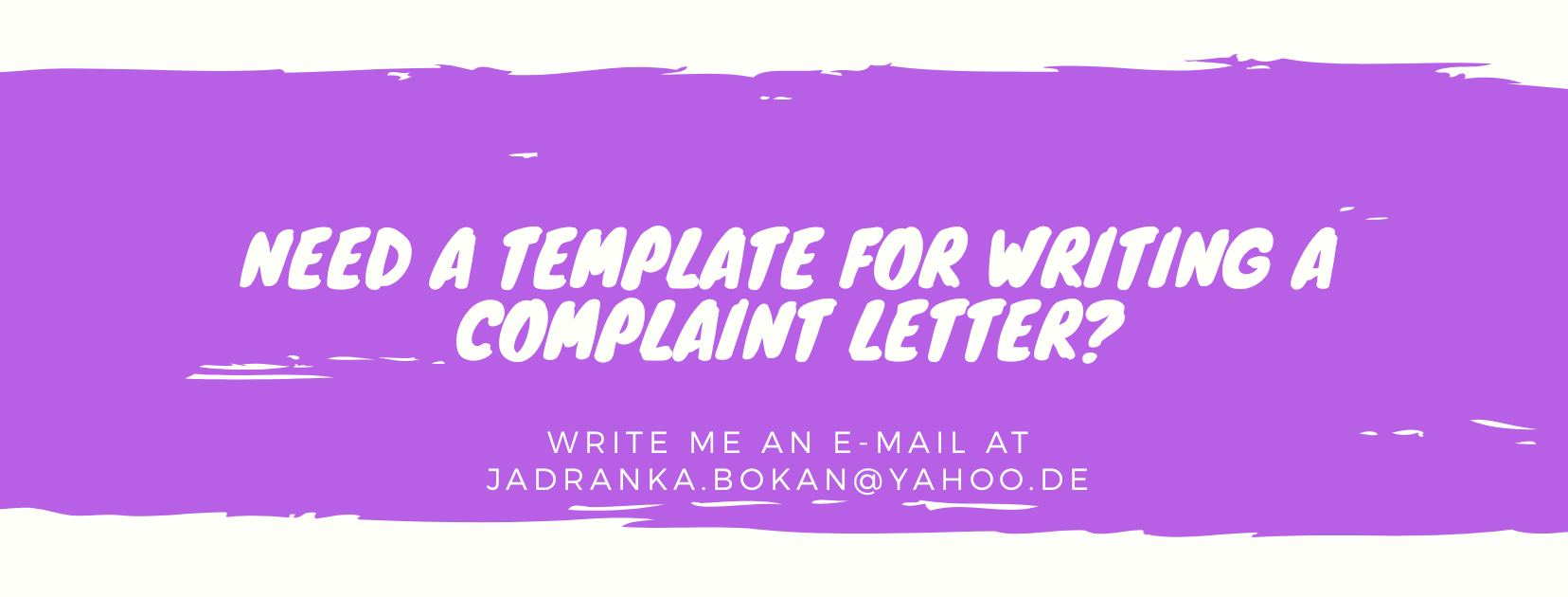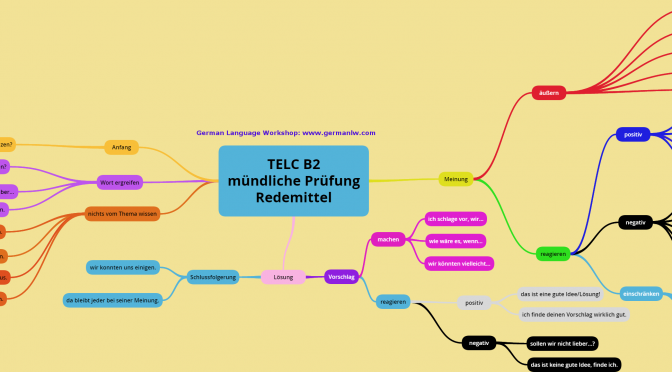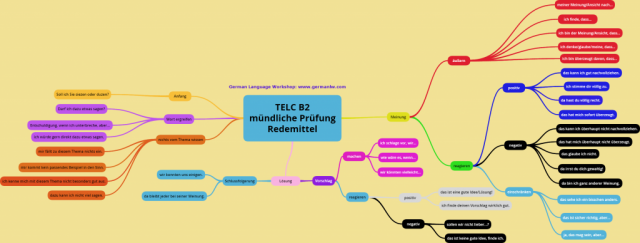Author: Jadranka Bokan
People who plan to go to Germany and work there (especially medical workers) usually need to take the TELC B2 exam. Since this is a very common situation I decided to write a short description of this exam so that you can orient yourself better.
The following text includes:
-recommended course books for the B2 level
-recommended preparation books for the TELC B2 exam
– TELC B2 exam description
-examples of the letter of complaint (Beschwerdebrief) and application (Bewerbung)
-Redemittel that you need for the oral part of the exam TELC B2
-example of a real test TELC B2
-word lists for all levels (A1-B2)
–grammar overview (B2)
Recommended text book(s):
Erkundungen B2 and even better Mittelpunkt B2. Ziel B2 is good, but in my opinion very complicated and extensive. You can order your copies here (just click on the Play button):
Writing:
In the written part of the exam you will have to write either:
– letter of complaint (Beschwerdebrief) or
– asking for more information (Bitte um Informationen) or
– application (Bewerbung) – this task comes up seldom.
Examples of complaints can be found here:
Beschwerdebrief schreiben: general rules
Beschwerdebrief: Laptop not working
Beschwerdebrief: German language course not satisfying
Examples of applications can be found here:
Bewerbung: general rules
Bewerbung: Freiwilliges Soziales Jahr
Beschwerde – general rules:
-you should use Präteritum when you are writing about past actions
-you should first write your name and address (in the upper left corner), then the name and the address of the institution/person that you are writing to (in the upper left corner right below your name and address); the place and date (you don’t to use “den” in front of the date) should be placed on the right hand side of the page in one line and separated by a comma.
– the first line below the addresses is the subject line – it’s something like a title, so that it’s known why you are writing. You can write something like: Beschwerde über den Aufenthalt in Ihrem Hotel
– You should also name the people that you are writing to (below the subject line): Sehr geehrte Damen und Herren (if you don’t know precisely) or Sehr geehrter Herr (his surname)/sehr geehrte Frau (her surname) and then put the comma because you will continue writing immediately afterwards
– the first sentence of the body of your letter should be an introduction. You can write something like: Hiermit möchte ich mich über den Aufenthalt in Ihrem Hotel beschweren (don’t mix up the verb “sich beschweren” which doesn’t contain the letter “d” and the noun “die Beschwerde” which does contain the letter “d”).
– Then you should describe the situation, start from the very start and describe the context, for example: Als ich Ihre Anzeige in der Zeitung gelesen habe, buchte ich sofort 2 Wochen in Ihrem Hotel.
– You could now summarize the bad experience and write: Im Juni 2016 verbrachte ich 14 schreckliche Tagen in Ihrem Hotel.
– Now you could start describing everything that went bad i.e. you should now explain why those days were so horrible: meine Enttäuschung war groß, als ich am Flughafen nicht abgeholt wurde und in Ihrer Anzeige stand es, dass das Angebot “all inclusive” ist. Ich war 6 Stunden mit öffentlichen Verkehrsmitteln unterwegs, bis ich Ihr Hotel fand. Also, es lang außerhalb und nicht zentral. Statt “Strandlage” befand sich das Hotel 7 km vom Meer entfernt. In Ihrer Anzeige wurde es anders beschrieben (you should always refer to the text of the ad and what were your expectations). Mein Zimmer war… Das Fenster ließ sich nicht öffnen… Die Mahlzeiten im Hotel ließen zu wünschen übrig, ich war ständig hungrig. Das Personal war…
– In the end say what you want: ich möchte, dass Sie mir die Kosten für meinen Aufenthalt zurückzahlen/erstatten.

If you want to prepare yourself for the TELC B2 exam with me, click here.
Oral exam:
This part lasts about 15 minutes. You will take it in pairs (you will get a partner who is taking the exam exactly as you).
It consists of 3 parts:
1. short presentation
2. discussion
3. planning something
After you introduce yourself, the first part is a short presentation, then you should start discussion and the third part is planning something with your partner.
It is very important that you learn Redemittel (sentences that help you structure your speaking) for the parts 2 and 3 by heart, because it gives you time to think about the real content of your sentences.
All needed Redemittel you can find here:
Let me explain it to you:
After you have introduced yourself and held a short presentation, you will start with the part 2 (discussion).
You and your partner will get one or two texts with the same topic and you will have to talk about it.
First you could ask your partner if they prefer that you use “Sie” or “du” during the talking (see the mind map)
Then, you should present your text in short by using these Redemittel:
das Thema des Artikels lautet: …
Die Hauptinformation hier ist, dass…
Es wurde nachgewiesen, dass…
Ich finde auch Folgendes wichtig: …
Außerdem (+Verb+Subject)
You don’t have to use them all – just pick the ones that you like the most and that you need for that particular text.
After that, you can express your opinion (see the mind map).
Once you are done, ask your partner about their opinion:
Was hältst du davon?
or: Wie ist deine Meinung dazu/zu diesem Thema?
or: was denkst du darüber?
If your partner talks too much, then feel free to interrupt them (see the mind map)
You should also react on your partner’s opinion – positively or negatively (see the mind map)
It could of course happen that you don’t have much to say about the topic that you are speaking about – in that case you could just say something like… see the mind map. This isn’t very popular because you should of course speak in the oral exam and show your abilities, however, with these Redemittel you can “buy time” and talk while you are thinking about the topic and what you could say about it.
At the end, it could be that you have agreed or not – you can sum that verbally up (see the mind map)
For the part 3 you can use the lower part of the mind map (make a suggestion, react on it and sum up the outcome).
You will have 20 minutes to prepare yourself for the oral exam. Use that time wisely – read the text for the part 2 and make notes (what is the main idea, what are the pros and cons) and make sure that you mention your personal experience and depict the situation in your family, school, country etc.
You should prepare a short presentation for the beginning of the oral exam. It should last about a minute, while another minute will be spent on partner’s questions related to your presentation. Make sure that you choose the topic that really interests/excites you most (if you do so, you won’t forget anything that you wanted to say!):
– your hobby
– film that you saw lately
– book
– trip
– concert
– sports event
– person that is important for you
– some important experience that you have made in life
Make sure that you use complex things, e.g. complex conjunctions (Doppelkonjunktionen) like dadurch… dass (e.g. die Wege entstehen dadurch, dass man sie geht); Verb-Nomen Verbindungen (e.g. man soll auf andere Rücksicht nehmen) etc. In some resources they say that you will get to choose one of 5 topics, so make sure to prepare at least one of them too: your favorite film, your favorite book, your dream holiday.
For a video that shows you how the oral exam looks like click here.
Official exam description
with detailed explanations and tips can be found here.
Preparation book for the exam:
If you find some time, it would be beneficial if you would take a look at this book which shows you the exact format of the test: Mit Erfolg zu TELC B2.
Test yourself:
Once you feel ready, do this online TELC B2 test
Repetition:
Words (Wortschatz):
*If you want to make sure that your knowledge is good enough at the levels A1 – B1, I recommend you to go through these word lists (with example sentences):
A1: Unterwegs Deutsch lernen A1 (app, Goethe Institute)
A1: Word list A1 (Goethe Institute)
A2: Word list A2 (Goethe Institute)
B1: Word list B1(Goethe Institute)
You could print them out and read them as newspapers. Highlight the words and phrases that you still need to learn. For ideas how to learn new words in the most efficient manner read tips & tools for learning new words.
B2: Basic German Vocabulary B2 (Langenscheidt)
This is a bilingual (German – English) vocabulary that contains the core vocabulary and facilitates it in the easiest and most efficient manner possible. It is meant for use by beginner learners, by more advanced students as a review and for test preparation. It enables you to communicate better in all everyday situations in German and covers the vocabulary at the B2 level. You can order your copy by clicking on the above link.




